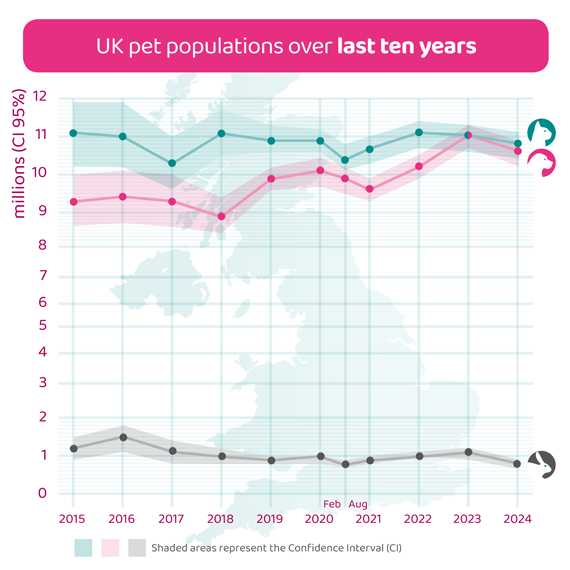We’re a nation of animal lovers – but have you ever wondered how many pets there actually are in the UK? Well, we have the answer!
Every year we work with YouGov to survey the UK’s pet owners and find out all about the wellbeing of our pets. Using a nationally representative sample of pet owners, we can accurately estimate the number of pet dogs, cats, and rabbits in the UK. You can read all our latest findings in the 2024 PDSA Animal Wellbeing (PAW) Report as well as further details of our methodology.
Our 2024 findings showed that:
- 51% of UK adults own a pet
- 28% of UK adults have a dog - an estimated population of 10.6 million pet dogs
- 24% of UK adults have a cat - an estimated population of 10.8 million pet cats
- 2% of UK adults have a rabbit - an estimated population of 800,000 pet rabbits
The proportion of UK adults owning a cat is lower than the proportion owning a dog despite similar population sizes due to a higher number of cats per cat owner than dogs per dog owner. 39% of cat owners own more than one cat, whilst only 24% of dog owners own more than one dog.
You can read the latest version of the PAW Report here and you can download previous versions here.

Data from our 14 years of PAW Reports
Cat population (millions) |
Dog population (millions) |
Rabbit population (millions) |
|
|---|---|---|---|
PAW Report 2024 |
10.8 |
10.6 |
0.8 |
PAW Report 2023 |
11 |
11 |
1.1 |
PAW Report 2022 |
11.1 |
10.2 |
1.0 |
PAW Report 2021 |
10.7 |
9.6 |
0.9 |
PAW Report 2020 - August survey |
10.4 |
9.9 |
0.8 |
PAW Report 2020 - February survey |
10.9 |
10.1 |
1 |
PAW Report 2019 |
10.9 |
9.9 |
0.9 |
| PAW Report 2018 | 11.1 |
8.9 |
1.0 |
| PAW Report 2017 | 10.3 |
9.3 |
1.1 |
| PAW Report 2016 | 11 |
9.4 |
1.5 |
| PAW Report 2015 | 11.1 |
9.3 |
1.2 |
PAW Report 2014* |
10.5 | 8.1 | 1.1 |
PAW Report 2013* |
9.6 |
7.9 |
1.4 |
PAW Report 2012* |
10.7 |
8.6 |
2.0 |
PAW Report 2011* |
11.8 |
8.2 |
1.6 |
* Figures from 2011 – 2014 may be different from those published at the time due to a more accurate way of estimating populations now that uses 2 decimal place figures as opposed to whole numbers in the calculation.
